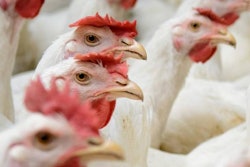
New outbreaks of highly pathogenic avian influenza (HPAI) in poultry have been reported in the Asian states of Vietnam, China and Taiwan, as well as in South Africa and Italy.
The earlier bird flu crisis in the Philippines has been officially declared over but the start of the seasonal wild bird migrations presents the threat of the disease’s return to European poultry flocks.
There have been two further human cases of H7N9 avian flu in China confirmed over the last week.
Asia: HPAI returns to Vietnam, China
After an absence of just four weeks, the H5N1 variant of the HPAI virus has returned to Vietnam’s poultry sector, according to the report from the country’s veterinary authority to the World Organisation for Animal Health (OIE). In the last week of August, the virus was detected in a backyard flock of 3,200 birds in Bac Lieu province in the south of the country after around 600 poultry died.
More than 9,700 domestic quail out of a flock of over 21,000 died at a farm in China’s Guizhou province in the second week of August. According to the official report to the OIE, the presence of the H5N6 was confirmed. The last time that virus strain was detected there was in August of 2016.
China’s animal health agency has reported to the OIE that an outbreak of HPAI of the H5N1 subtype from 2015 had been resolved after two tigers at a zoo in Guangxi died from the disease. There had been no further cases in the intervening period.
H5N2 HPAI continues to afflict the poultry sector in Taiwan. The veterinary authority has informed the OIE about two new outbreaks of the disease. One was in a flock of more than 18,000 native chickens in Yunlin county, and the virus was detected in three chickens at an illegal private slaughterhouse in Chiayi county. Efforts are being made to trace the infected birds back to the source farm.
Agriculture Secretary of the Philippines, Manny Piñol, has announced that his country’s avian flu crisis is over, reports Philippines Star. He lifted earlier restrictions of poultry shipments except within one kilometer of the earlier disease outbreaks, under certain conditions that include additional official inspections prior to bird movements. Hatching eggs can only be sourced from healthy flocks, transported in sealed vehicles, and must be fumigated at source and on arrival at the hatchery.
Africa: More birds affected by HPAI South Africa, Zimbabwe
Three out of the four latest outbreaks of H5N8 HPAI in South Africa have affected commercial ostriches in the municipality of Hessequa in Western Cape Province, with a total of 102 cases. According to the official report to the OIE, a flock of more than 18,000 commercial/domestic ducks in the city of Cape Town were affected in the other outbreak, leaving more than 5,500 of the birds dead, bringing the country’s total outbreaks to 28.
South African authorities have also informed the OIE about seven new outbreaks of HPAI in birds other than poultry. Six of these were also in Western Cape Province, and the other in Northern Cape. The H5N8 virus was detected in a total of 11 wild birds at various locations, in a mixed flock of 62 hobby ducks and swans, and in three groups of guinea fowl.
In Zimbabwe, an outbreak of H5N8 HPAI that began back in May remains confined to one poultry complex of around two million birds at Lanark in Mashonaland East, according to the OIE report. However, the infection is spreading between compartments at the location, and more than 790,000 chickens have been culled and buried on the site, along with potentially infected manure and eggs.
Europe: Two new HPAI outbreaks in Italian poultry, warning issued to UK farmers
The number of outbreaks of H5N8 HPAI in poultry in Italy so far this year has increased to 35.
The disease has been confirmed over the last week in a backyard chicken flock of 25 birds in the province of Pavia in Lombardy, and at a farm of 10,700 52-day-old male fattening turkeys in Verona in the region of Veneto, according to the Italian health authority and research organization for animal health and food safety (IZSVe).
The same virus has also been detected in a wild swan found dead near a pond at Bergamo in Lombardy.
Surveillance of wild birds in other European countries has revealed that the H5N8 variant of the HPAI virus has not left the continent. The virus has been detected recently in wild ducks found dead in two Swiss cantons, and at a nature park in the German region of Saxony-Anhalt.
Detection of the HPAI virus in Europe has prompted a clear warning to keepers of commercial and hobby poultry in the United Kingdom from the agriculture ministry (Defra).
“While it is undoubtedly good news we haven’t confirmed a case in kept birds in the UK for two months, the disease remains a threat–particularly as we move again towards the colder months,” said the UK’s Chief Veterinary Officer, Nigel Gibbens. “Simple actions you can take now, such as regularly cleaning and disinfecting the area where you keep your birds and signing up for free disease alerts, could really help to reduce the risk of your birds becoming infected this winter.”
Last winter, H5N8 HPAI affected 13 of the country’s poultry flocks.
China: New human avian flu cases
Hong Kong’s Centre for Health Protection reports that there has been two new confirmed cases of avian influenza A (H7N9) in China over the last week, both in Xinjiang province. These latest cases bring the global total to 1,561 since March of 2013, and Mainland China’s count to 755 since October last year.
















